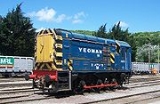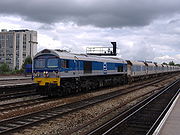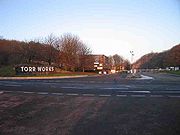
Foster Yeoman
Encyclopedia
Foster Yeoman Limited, based in the United Kingdom
, is one of Europe's largest quarry
ing and asphalt
companies, owned by Swiss construction materials conglomerate Holcim
.

 The Company was founded by Foster Yeoman, from Hartlepool
The Company was founded by Foster Yeoman, from Hartlepool
, at Dulcote
, near Wells
, in 1923. He was a former ship owner and had worked in the iron
and steel
business. Foster Yeoman had served in the First World War and went into quarrying to provide employment for ex-soldiers.
Between the wars Foster Yeoman Limited supplied contractors and local authorities in the South of England, reaching an early peak of prosperity in the 1930s. During the Second World War the firm supplied materials for the construction of airfields. Most stone was sent away by rail as it is today.
After the war, with Foster Yeoman ailing, business declined and the company came full circle, returning to the £20,000 turnover it had enjoyed in 1923. In 1949 Foster died and his son, John Foster Yeoman, became Managing Director at the age of 21. He employed Ron Torr to redevelop the plant. Despite his youth and inexperience, John Foster Yeoman turned the company round and within four years it was back in profit.
 Dulcote was not the best location and, with an eye to rising costs, competition and the need for future expansion, John Yeoman bought the under-exploited Merehead Quarry
Dulcote was not the best location and, with an eye to rising costs, competition and the need for future expansion, John Yeoman bought the under-exploited Merehead Quarry
(a.k.a. Torr Works) at East Cranmore in 1958. He developed this successfully in association with his chief engineer, Ron Torr, after whom the new quarry was named. This second Foster Yeoman quarry became operational in 1964 and was completed with the installation of the Nordberg Primary Crusher in 1970.
Since 1949, stone had been carried to its destination by lorry but now Foster Yeoman reverted to rail transport. The Merehead Stone Terminal was established in 1970. From there aggregate was removed by high capacity trains. This innovation was followed by the building of the railhead depot and coating plant at Botley
, Hampshire
, in 1973.
John Yeoman had long been captivated by the idea of the super-quarry to be situated in a remote location from which stone could be exported by sea. To this end, and always looking ahead, he bought the Glensanda
estate near Oban
in Argyll in 1982. A pilot plant was installed (extended in 1996) which extracts granite by the "Glory Hole
" and conveyor belt method, a pioneering development in alternative quarrying technology.
Glensanda went into operation in 1986 when the first shipload of granite left for Houston, Texas, USA. The Production Director at Glensanda is Kurt Larson, John and Angela Yeoman's son-in-law. Production at the Scottish quarry has now reached six million tonnes a year.
Progress and innovation were not confined to Glensanda. In 1985 the O & K Mobile Crusher came to Torr Works quarry and four Class 59 locomotives were commissioned from the USA to pull even heavier and longer loads from Torr Works to stone terminals in Southern England. Foster Yeoman was the first national company to run private locomotives on the then British Rail track.
In 1993, Foster Yeoman and ARC came together to form Mendip Rail
combining their locomotives and rolling stock in one streamlined operation. This created the third largest freight company in the UK, moving ten million tonnes of aggregate a year.
Foster Yeoman bought the derelict Marston House
, a Grade II* Listed Building, near Frome
, in 1984. The mansion dates in part from the early 17th century and has 106 rooms. It was restored over a seven year period as the company headquarters.
John Foster Yeoman died in 1987. He was succeeded by his widow, Mrs Angela Yeoman, OBE, DL. Their son, also John Foster Yeoman, became Managing Director in 1994 and vice chairman in 2004.
Notable landmarks in the company history have included the supplying of aggregate for the Thames Barrier
and the M25 motorway
. Foster Yeoman also supplied three million tonnes of rock used to make concrete segments for the English side of the Channel Tunnel
. Eighty per cent of Glensanda granite is exported to Europe using Foster Yeoman vessels: the Yeoman Brook, Yeoman Bank, Yeoman Bridge and the Yeoman Bontrup.
With its substantial interests in Northern Europe, Foster Yeoman now runs a locomotive on German railways. Its other interests include civil engineering and recycling. In 1997, it acquired RJ Maxwell with its London asphalt works and wharves, and now operates a very successful contracting division. Foster Yeoman continues to be one of the major suppliers of coated stone products. These are used for projects as diverse as motorways and tennis courts.
In 2006 Foster Yeoman was wholly acquired by the Holcim
Group and is now part of its Aggregate Industries
subsidiary and is no longer family owned.
, with Hanson plc
.
United Kingdom
The United Kingdom of Great Britain and Northern IrelandIn the United Kingdom and Dependencies, other languages have been officially recognised as legitimate autochthonous languages under the European Charter for Regional or Minority Languages...
, is one of Europe's largest quarry
Quarry
A quarry is a type of open-pit mine from which rock or minerals are extracted. Quarries are generally used for extracting building materials, such as dimension stone, construction aggregate, riprap, sand, and gravel. They are often collocated with concrete and asphalt plants due to the requirement...
ing and asphalt
Asphalt
Asphalt or , also known as bitumen, is a sticky, black and highly viscous liquid or semi-solid that is present in most crude petroleums and in some natural deposits, it is a substance classed as a pitch...
companies, owned by Swiss construction materials conglomerate Holcim
Holcim
Holcim is a Swiss-based global company supplying cement and aggregates . The company also supplies ready-mix concrete and asphalt including associated construction services.-Holcim Group:...
.
Company history


Hartlepool
Hartlepool is a town and port in North East England.It was founded in the 7th century AD, around the Northumbrian monastery of Hartlepool Abbey. The village grew during the Middle Ages and developed a harbour which served as the official port of the County Palatine of Durham. A railway link from...
, at Dulcote
Dulcote Quarry
Dulcote Quarry, was a limestone quarry at Dulcote, near Wells on the Mendip Hills, Somerset, England. The quarry measures around from West to East and around from North to South, with an area of , which is surrounded by of woodland. The floor of the quarry is to above Ordnance Datum.The site...
, near Wells
Wells
Wells is a cathedral city and civil parish in the Mendip district of Somerset, England, on the southern edge of the Mendip Hills. Although the population recorded in the 2001 census is 10,406, it has had city status since 1205...
, in 1923. He was a former ship owner and had worked in the iron
Iron
Iron is a chemical element with the symbol Fe and atomic number 26. It is a metal in the first transition series. It is the most common element forming the planet Earth as a whole, forming much of Earth's outer and inner core. It is the fourth most common element in the Earth's crust...
and steel
Steel
Steel is an alloy that consists mostly of iron and has a carbon content between 0.2% and 2.1% by weight, depending on the grade. Carbon is the most common alloying material for iron, but various other alloying elements are used, such as manganese, chromium, vanadium, and tungsten...
business. Foster Yeoman had served in the First World War and went into quarrying to provide employment for ex-soldiers.
Between the wars Foster Yeoman Limited supplied contractors and local authorities in the South of England, reaching an early peak of prosperity in the 1930s. During the Second World War the firm supplied materials for the construction of airfields. Most stone was sent away by rail as it is today.
After the war, with Foster Yeoman ailing, business declined and the company came full circle, returning to the £20,000 turnover it had enjoyed in 1923. In 1949 Foster died and his son, John Foster Yeoman, became Managing Director at the age of 21. He employed Ron Torr to redevelop the plant. Despite his youth and inexperience, John Foster Yeoman turned the company round and within four years it was back in profit.

Torr Works
Torr Works quarry, is a limestone quarry at East Cranmore, near Shepton Mallet on the Mendip Hills, Somerset, England. It is also known as Merehead Quarry....
(a.k.a. Torr Works) at East Cranmore in 1958. He developed this successfully in association with his chief engineer, Ron Torr, after whom the new quarry was named. This second Foster Yeoman quarry became operational in 1964 and was completed with the installation of the Nordberg Primary Crusher in 1970.
Since 1949, stone had been carried to its destination by lorry but now Foster Yeoman reverted to rail transport. The Merehead Stone Terminal was established in 1970. From there aggregate was removed by high capacity trains. This innovation was followed by the building of the railhead depot and coating plant at Botley
Botley railway station
Botley railway station is a railway station in Botley, Hampshire.-History:Botley station was opened in 1841 by the LSWR. Botley was once the junction for the Bishops Waltham branch which was opened in 1863 and finally closed to freight in 1962...
, Hampshire
Hampshire
Hampshire is a county on the southern coast of England in the United Kingdom. The county town of Hampshire is Winchester, a historic cathedral city that was once the capital of England. Hampshire is notable for housing the original birthplaces of the Royal Navy, British Army, and Royal Air Force...
, in 1973.
John Yeoman had long been captivated by the idea of the super-quarry to be situated in a remote location from which stone could be exported by sea. To this end, and always looking ahead, he bought the Glensanda
Glensanda
Glensanda was a Viking settlement at the mouth of Glen Sanda on the Morvern peninsula within south west Lochaber, overlooking the Isle of Lismore and Loch Linnhe in the western Highlands of Scotland....
estate near Oban
Oban
Oban Oban Oban ( is a resort town within the Argyll and Bute council area of Scotland. It has a total resident population of 8,120. Despite its small size, it is the largest town between Helensburgh and Fort William and during the tourist season the town can be crowded by up to 25,000 people. Oban...
in Argyll in 1982. A pilot plant was installed (extended in 1996) which extracts granite by the "Glory Hole
Shaft mining
Shaft mining or shaft sinking refers to the method of excavating a vertical or near-vertical tunnel from the top down, where there is initially no access to the bottom....
" and conveyor belt method, a pioneering development in alternative quarrying technology.
Glensanda went into operation in 1986 when the first shipload of granite left for Houston, Texas, USA. The Production Director at Glensanda is Kurt Larson, John and Angela Yeoman's son-in-law. Production at the Scottish quarry has now reached six million tonnes a year.
Progress and innovation were not confined to Glensanda. In 1985 the O & K Mobile Crusher came to Torr Works quarry and four Class 59 locomotives were commissioned from the USA to pull even heavier and longer loads from Torr Works to stone terminals in Southern England. Foster Yeoman was the first national company to run private locomotives on the then British Rail track.
In 1993, Foster Yeoman and ARC came together to form Mendip Rail
Mendip Rail
Mendip Rail Ltd is an independent freight operating railway company in Great Britain. It is composed of the rail-operation divisions of Aggregate Industries and Hanson Aggregates ....
combining their locomotives and rolling stock in one streamlined operation. This created the third largest freight company in the UK, moving ten million tonnes of aggregate a year.
Foster Yeoman bought the derelict Marston House
Marston Bigot
Marston Bigot is a small village near Nunney and south of Frome in Somerset, England.-History:Marston Bigot was listed as "Mersitone-tora" in the Doomesday Book, which gave the name of the then Saxon landowner as Robert Arundel. It became known as Marston Bigot some time after it was given by...
, a Grade II* Listed Building, near Frome
Frome
Frome is a town and civil parish in northeast Somerset, England. Located at the eastern end of the Mendip Hills, the town is built on uneven high ground, and centres around the River Frome. The town is approximately south of Bath, east of the county town, Taunton and west of London. In the 2001...
, in 1984. The mansion dates in part from the early 17th century and has 106 rooms. It was restored over a seven year period as the company headquarters.
John Foster Yeoman died in 1987. He was succeeded by his widow, Mrs Angela Yeoman, OBE, DL. Their son, also John Foster Yeoman, became Managing Director in 1994 and vice chairman in 2004.
Notable landmarks in the company history have included the supplying of aggregate for the Thames Barrier
Thames Barrier
The Thames Barrier is the world's second-largest movable flood barrier and is located downstream of central London. Its purpose is to prevent London from being flooded by exceptionally high tides and storm surges moving up from the sea...
and the M25 motorway
M25 motorway
The M25 motorway, or London Orbital, is a orbital motorway that almost encircles Greater London, England, in the United Kingdom. The motorway was first mooted early in the 20th century. A few sections, based on the now abandoned London Ringways plan, were constructed in the early 1970s and it ...
. Foster Yeoman also supplied three million tonnes of rock used to make concrete segments for the English side of the Channel Tunnel
Channel Tunnel
The Channel Tunnel is a undersea rail tunnel linking Folkestone, Kent in the United Kingdom with Coquelles, Pas-de-Calais near Calais in northern France beneath the English Channel at the Strait of Dover. At its lowest point, it is deep...
. Eighty per cent of Glensanda granite is exported to Europe using Foster Yeoman vessels: the Yeoman Brook, Yeoman Bank, Yeoman Bridge and the Yeoman Bontrup.
With its substantial interests in Northern Europe, Foster Yeoman now runs a locomotive on German railways. Its other interests include civil engineering and recycling. In 1997, it acquired RJ Maxwell with its London asphalt works and wharves, and now operates a very successful contracting division. Foster Yeoman continues to be one of the major suppliers of coated stone products. These are used for projects as diverse as motorways and tennis courts.
In 2006 Foster Yeoman was wholly acquired by the Holcim
Holcim
Holcim is a Swiss-based global company supplying cement and aggregates . The company also supplies ready-mix concrete and asphalt including associated construction services.-Holcim Group:...
Group and is now part of its Aggregate Industries
Aggregate Industries
Aggregate Industries, a member of the Holcim Group, is an aggregates, construction and building materials group, with its base in the United Kingdom. It was listed on the London Stock Exchange until it was acquired by Holcim in 2005.-History:...
subsidiary and is no longer family owned.
Rail logistics
Foster Yeoman transports most of its stone product from Merehead to various UK distribution points using the services of jointly-owned rail company Mendip RailMendip Rail
Mendip Rail Ltd is an independent freight operating railway company in Great Britain. It is composed of the rail-operation divisions of Aggregate Industries and Hanson Aggregates ....
, with Hanson plc
Hanson plc
Hanson plc is a British based international building materials company, headquartered in Maidenhead. Traded on the London Stock Exchange and a constituent of the FTSE 100 Index for many years, the company was acquired by a division of German rival Heidelberg Cement in August 2007.-History:Hanson...
.

